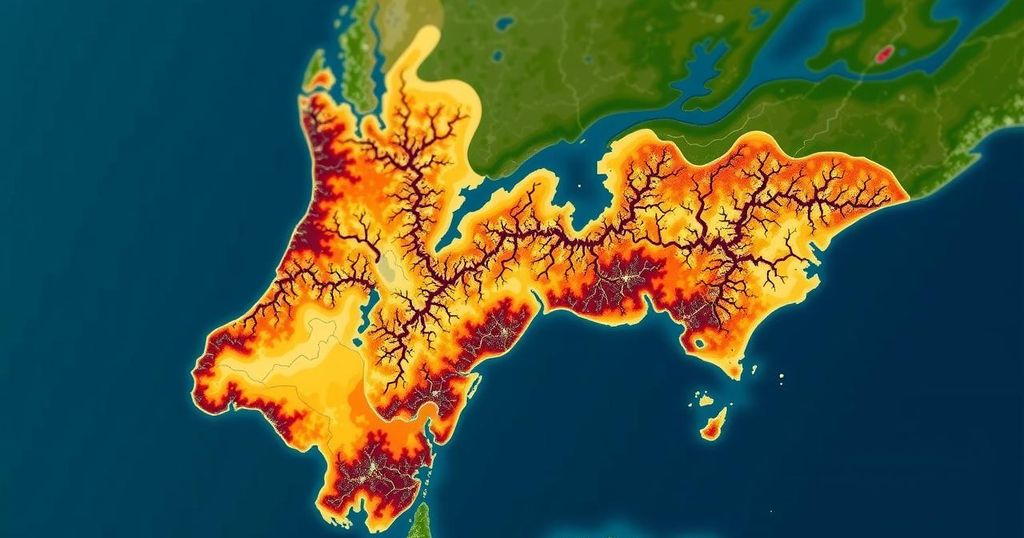Drought Conditions Have Tripled Since the 1980s, Study Reveals
A new report reveals that drought-affected land has tripled since the 1980s, with 48% of the Earth suffering from extreme drought conditions last year. The study highlights significant risks to water security, public health, and food supply due to changing climate patterns, with a noted increase in the frequency of both droughts and intense rainfall. The health impacts are dire, contributing to soaring food insecurity and the spread of diseases. Immediate action is necessary to halt further climate change effects.
A recent study has revealed a dramatic increase in the area of land affected by drought since the 1980s. According to the Lancet Countdown on Health and Climate Change, approximately 48% of the Earth’s land experienced at least one month of extreme drought last year, a stark contrast to the 15% average recorded during the 1980s. Furthermore, nearly one-third of the globe, or 30%, faced extreme drought conditions lasting three months or longer in 2023, compared to just 5% in the 1980s. This study provides critical insights into the accelerating global drought crisis, which poses significant risks to water supply, food security, and public health. The conditions for extreme drought are defined by six months of minimal rainfall or heightened evaporation levels, which further complicate agriculture, energy supplies, and transportation. The report emphasizes that while individual droughts result from various factors, climate change is notably shifting global rainfall patterns, exacerbating the vulnerability of regions such as South America, the Middle East, and the Horn of Africa. For instance, drought in the Amazon is endangering weather patterns vital for cloud formation, leading to a self-perpetuating cycle of drought. In recent years, contrasting extreme rainfall has also been observed, with 61% of the world recording increased intense rainfall compared to the 1961-1990 baseline. This phenomenon is attributed to warmer air holding more moisture, which, when converted into storms, results in heavier rain. Moreover, the report highlights concerning health impacts: food insecurity has risen by 151 million people since the 1990s, while heat-related deaths among individuals over 65 have surged by 167%. Additionally, diseases such as dengue fever, malaria, and West Nile virus are spreading to new territories, correlating with the increasing temperatures and rainfall. In locations where water demand already exceeds supply, such as northeast Syria and parts of Iraq, residents are experiencing dire shortages of clean water, with some resorting to risky groundwater extraction methods. Similarly, in South Sudan, severe drought conditions have afflicted the majority of the country, compounded by instances of flooding which further jeopardize health and nutrition. Experts warn that unless greenhouse gas emissions are reduced and global temperatures stabilized, both droughts and subsequent intense rainfall will likely persist and escalate. According to Marina Romanello, executive director of the Lancet Countdown, “The climate is changing fast; it is changing to conditions that we are not used to and that we did not design our systems to work around.” The health and societal impacts of these changes are extensive and will continue to challenge the resilience and adaptability of communities worldwide.
The increasing frequency and severity of droughts amid changing climate patterns represent a significant global challenge. This situation underscores the need for urgent action regarding climate change as it affects not only the environment but also public health, food security, and economic stability. The data from the Lancet Countdown research highlights the ramifications of climate change on ecosystems and human societies, emphasizing the interconnected nature of droughts and floods. As many regions grapple with diminishing water resources, the implications for agriculture, energy production, and health care systems are profound, necessitating informed policy responses and commitment to mitigating climate change.
The recent findings indicate that drought conditions have escalated alarmingly since the 1980s, affecting nearly half of the Earth’s land surface and posing severe risks to public health and food security. The interplay between droughts and extreme rainfall reflects the complexities of climate change, necessitating immediate action to address greenhouse gas emissions. Without resolute measures, the global community is likely to face increasingly severe climate-related challenges, underscoring the urgency of adaptation and resilience strategies.
Original Source: www.bbc.com




Post Comment